初中英语动词的时态与语态总结
- 格式:doc
- 大小:60.00 KB
- 文档页数:8

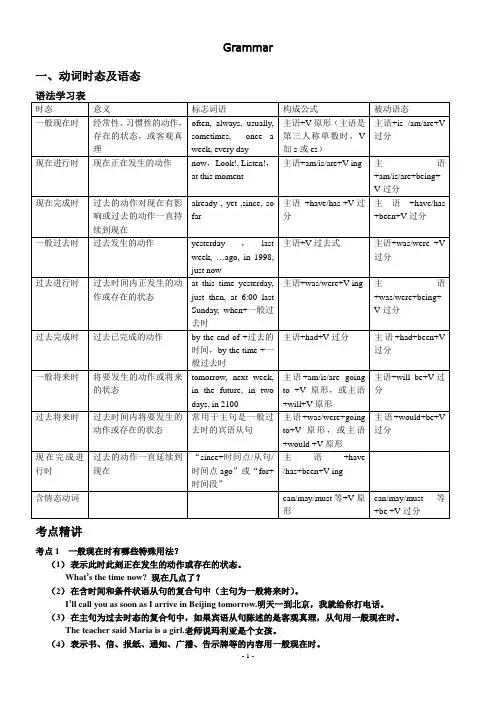
Grammar一、动词时态及语态语法学习表时态意义标志词语构成公式被动语态一般现在时经常性、习惯性的动作,存在的状态,或客观真理often, always, usually,sometimes, once aweek, every day主语+V原形(主语是第三人称单数时,V加s或es)主语+is /am/are+V过分现在进行时现在正在发生的动作now,Look!, Listen!,at this moment 主语+am/is/are+V-ing 主语+am/is/are+being+V过分现在完成时过去的动作对现在有影响或过去的动作一直持续到现在already , yet ,since, sofar主语+have/has +V过分主语+have/has+been+V过分一般过去时过去发生的动作yesterday ,lastweek, …ago, in 1998,just now 主语+V过去式主语+was/were +V过分过去进行时过去时间内正发生的动作或存在的状态at this time yesterday,just then, at 6:00 lastSunday, when+一般过去时主语+was/were+V-ing 主语+was/were+being+V过分过去完成时过去已完成的动作by the end of +过去的时间,by the time +一般过去时主语+had+V过分主语+had+been+V过分一般将来时将要发生的动作或将来的状态tomorrow, next week,in the future, in twodays, in 2100主语+am/is/are goingto +V原形,或主语+will+V原形主语+will be+V过分过去将来时过去时间内将要发生的动作或存在的状态常用于主句是一般过去时的宾语从句主语+was/were+goingto+V原形,或主语+would +V原形主语+would+be+V过分现在完成进行时过去的动作一直延续到现在“since+时间点/从句/时间点ago”或“for+时间段”主语+have/has+been+V-ing含情态动词can/may/must等+V原形can/may/must等+be +V过分考点精讲考点1 一般现在时有哪些特殊用法?(1)表示此时此刻正在发生的动作或存在的状态。
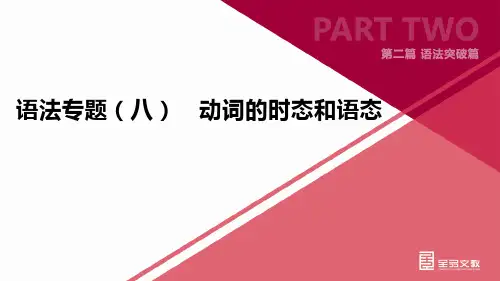
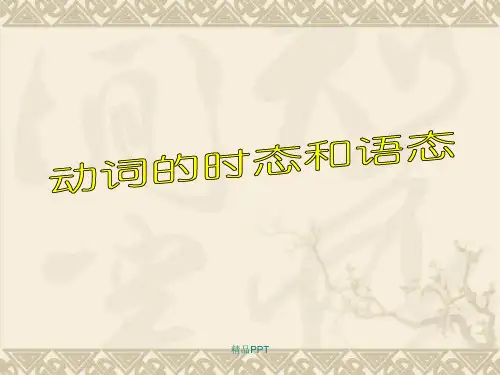
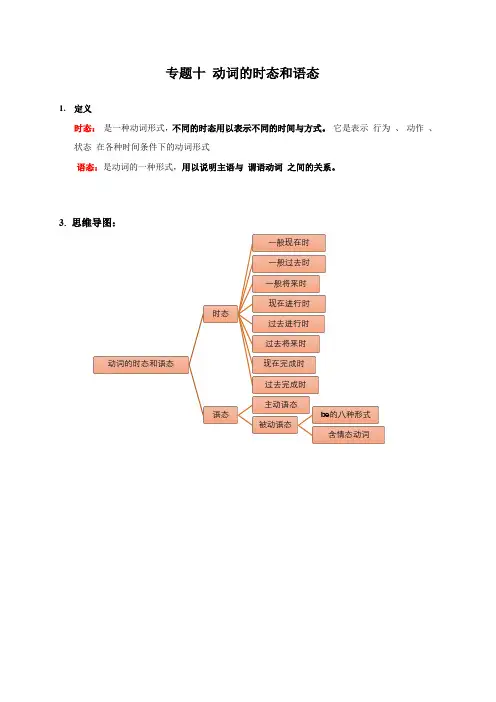
专题十动词的时态和语态1.定义时态:是一种动词形式,不同的时态用以表示不同的时间与方式。
它是表示行为、动作、状态在各种时间条件下的动词形式语态:是动词的一种形式,用以说明主语与谓语动词之间的关系。
3. 思维导图:动词的时态和语态时态一般现在时一般过去时一般将来时现在进行时过去进行时过去将来时现在完成时过去完成时语态主动语态被动语态be 的八种形式含情态动词1.动词的时态1.常考的时态构成及用法a.一般现在时d.现在进行时e.过去进行时f.过去将来时g.现在完成时h.过去完成时2. 动词的语态a. 分类:主动语态:表示主语是动作的执行者被动语态:表示并语是动作的执行者c.主动语态和被动语态的转换规则典型例题总分:50分姓名:得分:1.单选题(每小题1分,共50分)( ) 1. Jenny, together with the Greens the White Tower Park if it tomorrow.A.are going to; isn't rainyB.is going to; doesn't rainC.are going to; won't rainD.is going to; isn't rain( ) 2. The old man for quite some time.A.has diedB.dieC.has deadD.has been dead( ) 3. It is reported that a tall building in the city next year.A.will be builtB.were buildC.have builtD.will build( ) 4. My sister for 2 years.A.has marriedB.have got marriedC.has been marriedD.married( ) 5. Chinese ________in many schools around the world and many people love to learn it.A.teachesB.is teachingC.has taughtD.is taught( ) 6. When Tom was in primary school, he ________the piano every day.A.playsB.playedC.was playingD.has played( ) 7. A baby's first month birthday is a special event in China and _____with a special Party.A.celebratesB.is celebratedC.was celebratedD.will celebrate( ) 8. -Were you at home at 9 o'clock last night?-Yes, I a shower at that time.A.tookB.was takingC.was takenD.am taking( ) 9. National Day celebrations for China's seventieth birthday in about three months.A.will be heldB.will holdC.is heldD.was held( ) 10. We don't know if he tomorrow. If he, I will call youA.will come, will comeB.will come, comeses, will comees, comes( ) 11. He told me that he ______ his uncle in Thailand the next day.A.will visitB.has visitedC.is going to visitD.would visit( ) 12. -Tom, do you know ________? -In Beijing.A.where will the 24th Winter Olympics be heldB.where the 24th Winter Olympics will holdC.where the 24th Winter Olympics will be heldD.where will the 24th Winter Olympics hold( ) 13. Peter with his classmates ________ for the bus when the earthquake happened.A.is waitingB.was waitingC.are waitingD.were waiting( ) 14. his museum ________ here for over 80 years. It ________ one of the oldest buildings in this city.A.is; wasB.had been; isC.was; has beenD.has been; is( ) 15. -Mrs. Brown, how long can books from the school library ?-At most two weeks.A.borrowB.keepC.be borrowedD.be kept( ) 16.-An AI robot _____in our school dining hall next term.-I'm looking forward to it.A.will useB.will be usedC.is usedD.was used( ) 17. Usually a baby's face ____ smooth.A.is feelingB.feltC.feels likeD.feels( ) 18. She _____ an English magazine when I came in.A.readsB.has readC.will readD.was reading( ) 19. I will call you as soon as he______ here.A.arriveB.will arriveC.arrivesD.arrived( ) 20. Boys and girl, ______ learning and have fun!A.keepB.to keepC.keepingD.kept( ) 21. There ______a basketball game between these two grades in the gym this afternoon.A.willB.is going to haveC.is going to beD.will have( ) 22. We ______TV from seven to nine last night.A.were watchingB.will watchC.watchedD.watch( ) 23. Jack's mother taught me how ________ Yunnan rice noodles last weekend.A.to makeB.makingC.makeD.to making( ) 24. Mrs. Green said the plates ________ right away,or they would become difficult to wash.A.will be washedB.should washC.will washD.should be washed( ) 25. The documentary Under the Dome (《苍穹之下》)which ________ by Chai Jing showed us that the air pollution in China was very serious.A.producesB.producedC.is producedD.was produced( ) 26. -What did you do last night?- I ________ my homework and watched TV.A.didB.doC.am doingD.will do( ) 27.The hospital is very famous. It _______ in 2001.A.buildsB.builtC.was builtD.is built( ) 28.These rules are made the disabled.A.protectB.protectedC.to protectD.protecting( ) 29. -How much does the TV ?-Not too much. It's just a second-handed one.A.costB.spendC.takeD.pay for( ) 30. -Have you ever ________ an amusement park?- Yes, I have ________ Fun Times Amusement Park last year.A.been to, have gone toB.gone to, have been toC.go to, went toD.been to, went to( ) 31.We are glad to hear that the terrorists ________ by the brave policemen several days ago.A.are caughtB.were caughtC.have been caughtD.are going to be caught ( ) 32. -Why didn't you go to the party last night? - Because I _____.A.wasn't invitedB.didn't invitedC.haven't invitedD.don't invited ( ) 33. -What _____ you supposed ____ when you are in China?- You should shake hands.A.are, to doB.do, to doC.are, doingD.have, to do( ) 34. So far, we ________ English for three years.A.have learntB.learnC.learntD.had learnt( ) 35.The boy was made ______ the words again and again.A.copyB.copyingC.copiesD.to copy( ) 36. The sports meeting in our school now.A.being heldB.is havingC.is holdingD.is being held( ) 37. The window ____ ten minutes ago, and the room is bright now.A.can be cleanedB.is cleanedC.was cleanedD.will be cleaned( ) 38. -Oh, Mrs. King, your necklace looks nice. Is it new?-No, I _______ it for 2 years.A.hadB.have hadC.boughtD.have bought( ) 39. He has ordered a watch on line for his father and it _______ to him before Father's Day.A.sendB.will be sentC.was sentD.sent( ) 40. There ______ a funny cartoon on CCTV 6 this evening.A.willB.will haveC.is going to beD.is going to have( ) 41. -________ did your uncle leave his home town? -He ___________ for nearly twenty years.A.When, has leftB.When, has been awayC.How long, has leftD.How long, has been away ( ) 42. My uncle ________ Germany on business many times.A.has been onB.has gone toC.has been toD.has been in( ) 43. Her life ________ a lot during the last three years.A.changedB.changingC.has changedD.will change( ) 44. -Lisa was seen ______ an old man go across the street this morning. -What a kind girl she is!A.helpingB.helpedC.to helpD.helps( ) 45. My computer has broken down. I'll get it _______ this afternoon.A.repairsB.repairedC.to repairD.repairing。
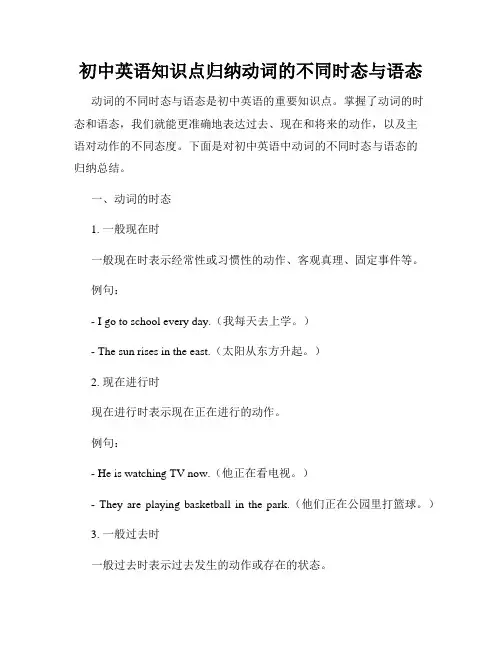
初中英语知识点归纳动词的不同时态与语态动词的不同时态与语态是初中英语的重要知识点。
掌握了动词的时态和语态,我们就能更准确地表达过去、现在和将来的动作,以及主语对动作的不同态度。
下面是对初中英语中动词的不同时态与语态的归纳总结。
一、动词的时态1. 一般现在时一般现在时表示经常性或习惯性的动作、客观真理、固定事件等。
例句:- I go to school every day.(我每天去上学。
)- The sun rises in the east.(太阳从东方升起。
)2. 现在进行时现在进行时表示现在正在进行的动作。
例句:- He is watching TV now.(他正在看电视。
)- They are playing basketball in the park.(他们正在公园里打篮球。
)3. 一般过去时一般过去时表示过去发生的动作或存在的状态。
例句:- We watched a movie last night.(昨晚我们看了一场电影。
)- She lived in Beijing when she was young.(她年轻时住在北京。
)4. 过去进行时过去进行时表示过去某个时间正在进行的动作。
例句:- They were having dinner at 7 o'clock yesterday.(昨天7点他们正在吃晚饭。
)- At this time last year, I was studying in London.(去年这个时间,我正在伦敦学习。
)5. 将来时将来时表示将要发生的动作或存在的状态。
例句:- We will go to the beach next week.(下周我们将去海滩。
)- She is going to visit her grandparents tomorrow.(她明天将要去看望她的祖父母。
)二、动词的语态1. 主动语态主动语态表示主语是动作的执行者。

初中英语动词的时态与语态总结动词的时态和语态是指动词表示的动作或状态发生的时间和动作的主体。
以下是初中英语常见的动词时态和语态总结:时态:1. 一般现在时态(Simple Present Tense):表示经常性或普遍性的动作或状态。
e.g. I go to school every day.(我每天上学。
)2. 一般过去时态(Simple Past Tense):表示过去发生的动作或状态。
e.g. She played basketball yesterday.(她昨天打篮球。
)3. 一般将来时态(Simple Future Tense):表示将来一些时间将要发生的动作或状态。
e.g. We will visit the museum tomorrow.(我们明天将要参观博物馆。
)4. 现在进行时态(Present Continuous Tense):表示现在正在进行的动作或状态。
e.g. They are watching a movie now.(他们正在看电影。
)5. 过去进行时态(Past Continuous Tense):表示过去一些时间正在进行的动作或状态。
e.g. He was studying English at 8 o'clock last night.(昨晚8点他正在学习英语。
)6. 将来进行时态(Future Continuous Tense):表示将来一些时间正在进行的动作或状态。
e.g. They will be playing soccer at 4 pm tomorrow.(他们明天下午4点将正在踢足球。
)7. 现在完成时态(Present Perfect Tense):表示过去一些时间开始的动作一直持续到现在,或者与现在有关系的过去动作或状态。
e.g. I have lived in this city for 10 years.(我在这个城市住了10年了。

初中动词的时态与语态动词是语言中最基本的词类之一,它用来表达动作、状态和行为。
在英语中,动词的时态和语态是非常重要的语法概念。
掌握动词的时态和语态对于我们正确使用动词、准确表达意思至关重要。
本文将对初中动词的时态和语态进行详细介绍。
一、动词的时态时态是指动词所表示动作、状态或者事实发生的时间。
英语中常见的时态有一般现在时、一般过去时、一般将来时、现在进行时、过去进行时、将来进行时、现在完成时、过去完成时、将来完成时等多种时态。
1. 一般现在时(Simple Present Tense)一般现在时表示经常性或者客观事实,常用来表达日常的习惯、科学事实、真理等等。
它的基本构成为主语 + 动词原形。
例如:- They play basketball every Sunday.(他们每周日打篮球。
)- Water boils at 100 degrees Celsius.(水在100摄氏度沸腾。
)2. 一般过去时(Simple Past Tense)一般过去时表示过去发生的动作或者状态,常用于叙述过去的经历或者事件。
它的基本构成为主语 + 动词过去式。
例如:- I visited my grandparents last weekend.(我上个周末去看望了我的祖父母。
)- She didn't go to school yesterday.(她昨天没有去上学。
)3. 一般将来时(Simple Future Tense)一般将来时表示将来要发生的动作或者状态,常用于表达计划、打算、预测等等。
它的基本构成为主语 + will + 动词原形。
例如:- We will have a party next Friday.(我们下周五要举办一个聚会。
)- She won't come to the meeting tomorrow.(她明天不会来参加会议。
)4. 现在进行时(Present Continuous Tense)现在进行时表示正在进行的动作,通常用于描述当前正在发生的事情。
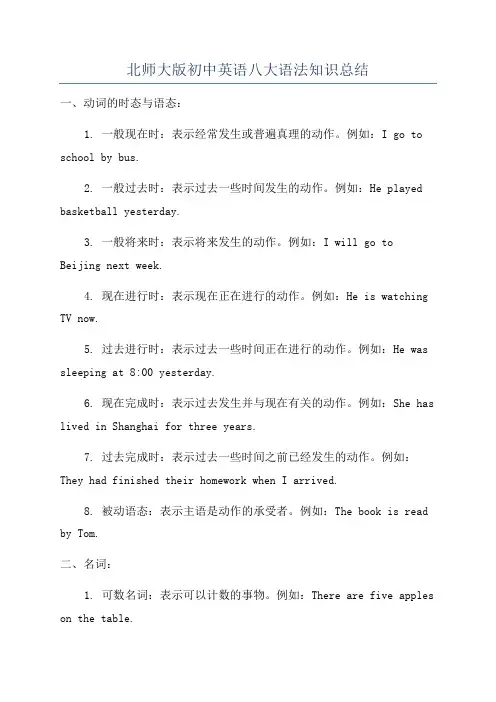
北师大版初中英语八大语法知识总结一、动词的时态与语态:1. 一般现在时:表示经常发生或普遍真理的动作。
例如:I go to school by bus.2. 一般过去时:表示过去一些时间发生的动作。
例如:He played basketball yesterday.3. 一般将来时:表示将来发生的动作。
例如:I will go toBeijing next week.4. 现在进行时:表示现在正在进行的动作。
例如:He is watching TV now.5. 过去进行时:表示过去一些时间正在进行的动作。
例如:He was sleeping at 8:00 yesterday.6. 现在完成时:表示过去发生并与现在有关的动作。
例如:She has lived in Shanghai for three years.7. 过去完成时:表示过去一些时间之前已经发生的动作。
例如:They had finished their homework when I arrived.8. 被动语态:表示主语是动作的承受者。
例如:The book is read by Tom.二、名词:1. 可数名词:表示可以计数的事物。
例如:There are five apples on the table.2. 不可数名词:表示无法计数的事物。
例如:She has a lot of homework to do.3. 复数形式:表示两个或两个以上的事物。
例如:I have two brothers.4. 特殊名词:不规则变化形式的名词。
例如:man — men, child — children.三、形容词与副词:1. 形容词:修饰名词,表示事物的性质、特征等。
例如:It is a beautiful flower.2. 副词:修饰动词、形容词等,表示动作或状态的方式、程度等。
例如:He speaks English fluently.四、动词:1.动词的时态与语态:参考第一点的内容。
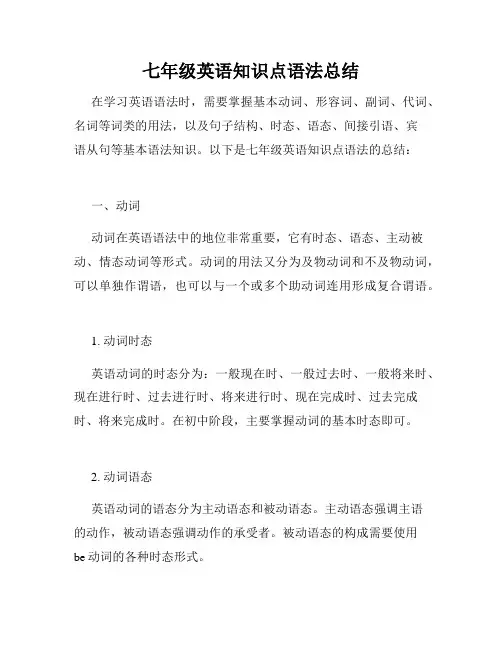
七年级英语知识点语法总结在学习英语语法时,需要掌握基本动词、形容词、副词、代词、名词等词类的用法,以及句子结构、时态、语态、间接引语、宾语从句等基本语法知识。
以下是七年级英语知识点语法的总结:一、动词动词在英语语法中的地位非常重要,它有时态、语态、主动被动、情态动词等形式。
动词的用法又分为及物动词和不及物动词,可以单独作谓语,也可以与一个或多个助动词连用形成复合谓语。
1. 动词时态英语动词的时态分为:一般现在时、一般过去时、一般将来时、现在进行时、过去进行时、将来进行时、现在完成时、过去完成时、将来完成时。
在初中阶段,主要掌握动词的基本时态即可。
2. 动词语态英语动词的语态分为主动语态和被动语态。
主动语态强调主语的动作,被动语态强调动作的承受者。
被动语态的构成需要使用be动词的各种时态形式。
3. 动词的主动和被动及物动词可以分为及物动词和自动词。
及物动词需要带宾语来完成对应的动作,而自动词不需要。
同时,及物动词还可以表示主动形式和被动形式。
主动形式表示主语执行动作,而被动形式则表示主语承受动作。
二、名词名词是客体的名称,具有可数性和不可数性。
名词在词性上可分为普通名词、专有名词、可数名词、不可数名词等。
1. 名词的单数和复数英语名词的复数形式有一定的规律性和不规律性。
常见的复数形式包括在词尾加s和es,同时还有一些不规则的形式。
2. 名词的所有格表示某个名词所属的关系,习惯上在名词的后面加’s。
三、形容词和副词英语形容词和副词是修饰词,作用不同,形容词通常修饰名词或代词,副词则修饰动词或其他形容词。
1. 形容词形容词用于修饰名词或者代词,通常放在名词或者代词的前面,以表达这个名词或者代词的特征。
2. 副词副词通常放在动词或者形容词后面,表示动作的方式、程度、时间、地点等情况。
四、代词代词是用来代替名词的一种词类,代替的一些名词有:人称代词、物主代词、指示代词、疑问代词、不定代词和相互代词。
1. 人称代词人称代词主要分为主格和宾格两类。
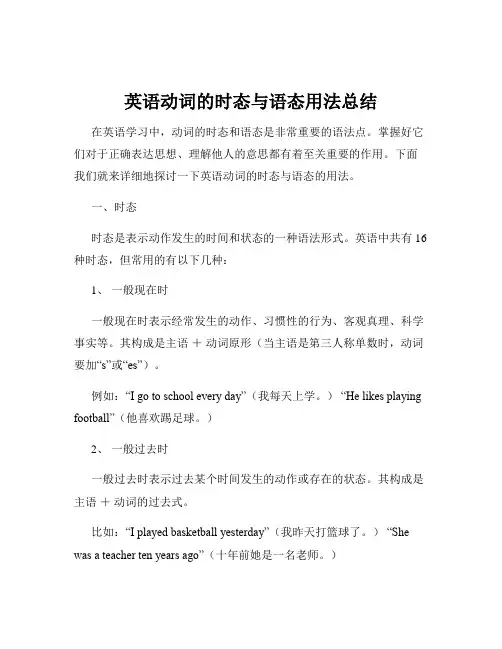
英语动词的时态与语态用法总结在英语学习中,动词的时态和语态是非常重要的语法点。
掌握好它们对于正确表达思想、理解他人的意思都有着至关重要的作用。
下面我们就来详细地探讨一下英语动词的时态与语态的用法。
一、时态时态是表示动作发生的时间和状态的一种语法形式。
英语中共有 16 种时态,但常用的有以下几种:1、一般现在时一般现在时表示经常发生的动作、习惯性的行为、客观真理、科学事实等。
其构成是主语+动词原形(当主语是第三人称单数时,动词要加“s”或“es”)。
例如:“I go to school every day”(我每天上学。
)“He likes playing football”(他喜欢踢足球。
)2、一般过去时一般过去时表示过去某个时间发生的动作或存在的状态。
其构成是主语+动词的过去式。
比如:“I played basketball yesterday”(我昨天打篮球了。
)“She was a teacher ten years ago”(十年前她是一名老师。
)3、一般将来时一般将来时表示将来要发生的动作或存在的状态。
常见的构成方式有“will +动词原形”和“be going to +动词原形”。
像:“I will visit my grandparents next week”(下周我将去看望我的祖父母。
)“It is going to rain”(要下雨了。
)4、现在进行时现在进行时表示正在进行的动作。
其构成是“be +动词的现在分词”。
例如:“They are having a meeting now”(他们正在开会。
)5、过去进行时过去进行时表示过去某个时刻正在进行的动作。
其构成是“was/were +动词的现在分词”。
比如:“I was reading a book at eight o'clock last night”(昨晚八点我正在读书。
)6、现在完成时现在完成时表示过去发生的动作对现在造成的影响或结果,或者过去开始的动作一直持续到现在。
1.动词时态(tense )时态---就是一种表示时间和状态的主动词形式。
1.1 现在进行时(present continuous/present progressive )1.1.1 时间:现在(present )--:动作发生的时间是现在而非过去,一般也就是说话时的时间。
1.1.2 状态:正在进行(continuous/progressive )。
指该动作在过去某个时间点开始,直到现在(说话时)仍然继续,在一定的时间范围内, 还将继续下去。
1.只有具有持续性概念的动作动词(action verb ), 才可能有进行时态, 而表示状态或瞬间动作的动词, 不能使用进行时态。
它们是不可持续的,往往具有状态动词的特征, 而不强调动作, 此类词一般常见的如下:表感情意识状态:like/dislike/love/hate/prefer/want/need/know/realize/suppose/mean/understand/believe/remember感官意识状态:see/ hear/ smell/ taste表所属关系: 有…,包含:belong / contain/consist/depend/seem/have当think 表示“认为”的意思时,同样也不用进行时态2. 即使是动作动词,同样也有动作持续时间长短的问题。
有的动作持续时间短,所以动作一般就发生在说话时由于这种动作只是从宏观上看具有持续性,但其间一定是有间断的,说话时,该动作不一定发生,只是说话的时间点包含在该动作的持续时间内。
1.1.3 构造: 助动词be , 主动词verb+ ing ,参见“词类概述2.3.4”.陈述句: subject + be + verb-ing否定句:subject + be+ not+ verb-ing一般疑问句:be + subject + verb-ing :?复杂(特殊)疑问句:question word+ subject + verb-ing :1.1.4 用途:1.用于表述正在发生的短动作,即说话时正在发生。
英语语法:动词的时态和语态英语语法:动词的时态和语态一般现在时一般过去时一般将来时过去将来时现在进行时主动do/does did will/shalldowould/shoulddoam/is/aredoing被动am/is/aredonewas/weredonewill/shallbe donewould/shouldbe doneam/is/arebeingdone过去进行时将来进行时现在完成时现在完成进行时过去完成时主动was/weredoingwill/shallbe doinghave/hasdonehave/has beendoinghad done被动was/werebeingdone----------have/hasbeen done----------had beendone一、一般现在时1、表示经常发生的习惯性的、现在反复出现的动作或状态,常用的时间状语有:always,usually,seldom, sometimes, every day, now and then, once a week等。
2、表示眼下或目前等现在时间所发生的动作或存在的状态,这种状态带有一定的持续性。
3、表示客观事实或普遍真理。
4、书报的标题,故事的叙述,小说、戏剧、电影等情节介绍,图片的说明等。
5、时间表、时刻表、日程表、节目单、课程表等按规定将要发生的动作,只限于go, arrive, leave, start, stay, return, begin, e等动词。
6、在时间、条件、方式、让步状语从句中,表示将来的动作。
注意:一般现在时可以用于定语从句或宾语从句中表示将来。
7、用在某些表达中,表示现在正在发生的动作或存在的状态。
Here es the bus!How it rains!二、一般过去时1、表示在过去某一时间点发生的动作或所处的状态,与现在没有关系。
常用的时间状语有:yesterday, last night, at that time等。
动词的时态和语态总结I、动词的时态:1、动词的时态一共有16种,以ask为例,将其各种时态的构成形式列表如下:现在时过去时将来时过去将来时一般ask / asksaskedshall/will askshould/would ask进行am/is/are askingwas/were askingshall/will be askingshould/would be asking完成have/has askedhad askedshall/will have askedshould/would have asked完成进行have/has been askinghad been askingshall/will have beenaskingshould/would have been asking II、动词的被动语态:常用被动语态构成常用被动语态构成1一般现在时am/is/are asked6过去进行时was/were being asked2一般过去时was/were asked7现在完成时have/has been asked3一般将来时shall/will be asked8过去完成时had been asked4过去将来时should/would be asked9将来完成时will/would have been asked5现在进行时am/is/are being asked10含有情态动词的can/must/may be asked注意事项被动语态的否定式是在第一个助动词或情态动词后加not,短语动词的被动态不可漏掉其中介副词。
固定结构be going to, used to, have to, had better变为被动态时,只需将其后的动词变为被动态。
如:Trees should not be planted in summer、 / The boy was made fun of by his classmates、Newspapers used to be sent here by the little girl、汉语有一类句子不出现主语,在英语中一般可用被动结构表示。
英语的时态语态总结归纳一、英语的时态总论1、英语有十种不同的时态,它们分别是:一般现在时、一般过去时、一般将来时、现在进行时、过去进行时、将来进行时、现在完成时、过去完成时、将来完成时和现在完成进行时。
2、时态的构成:时态由两个部分组成,即时和态。
时是指动词表示的行为发生的时间,态是指动词表示的行为的性质和情况,例如,进行态表示动作正在发生;完成态表示动作已发生;完成进行态表示动作已经发生且正在发生。
二、英语的时态归纳1、一般现在时:(1)表示现在习惯性的动作或存在的状况,例如,他每天早上8点起床;许多动物可以在海里游泳。
(2)表示现在客观真理,例如,太阳是由氢原子组成的;水的沸点是100摄氏度。
(3)表示目前的计划,例如,他本周末要回家;我们明天要去游览新宫。
2、一般过去时:(1)表示过去的习惯性动作或状况,例如,他以前每天早上8点起床;我上学时常跟朋友一起去游泳。
(2)表示过去的发生的事情,例如,他昨天回到家;我上周去参加会议。
(3)表示过去经常或反复发生的事情,例如,他经常和他的老师打电话;我总是在每次考试前担心。
3、一般将来时:(1)表示即将发生的动作或状况,例如,他明天早上起床要9点;我们下周要去海边度假。
(2)表示预定的计划,例如,他明天要回家;我们星期六要参加聚会。
(3)表示将来可能发生的情况,例如,这个孩子将来会很有名;这个项目很有可能会成功。
4、现在进行时:(1)表示正在进行或发生的动作,例如,他正在做家务;我正在学习英语。
(2)表示现在状况,例如,天气正在变凉;成绩正在提高。
5、过去进行时:(1)表示过去正在进行的动作,例如,他昨天晚上正在复习;我过去常常和朋友在一起玩。
(2)表示过去的临时动作,例如,他昨天晚上正在看书;我昨天正在准备考试。
6、将来进行时:(1)表示将来正在进行的动作,例如,他明天晚上正在打乒乓球;我们下星期一正在学习英语。
(2)表示将来临时动作,例如,他明天晚上正在看电视;我们下星期二正在准备考试。
英语语法:初中英语动词时态和语态讲解(一)动词是谓语动所表示的动作或情况发生时间的各种形式。
英语动词有16种时态,但是常用的只有9种:一般现在时、一般过去时、一般将来时、现在进行时、过去进行时、现在完成时、过去完成时、过去将来时、现在完成进行时。
下面分别介绍。
1、一般现在时的用法1)表示经常性、习惯性的动作;表示现在的状态、特征和真理。
句中常用often, usually, every day 等时间状语。
例如:a. He goes to school every day.b. He is very happy.c.The earth moves around the sun.2) 在时间状语从句和条件状语从句中,用一般现在时表示将来。
例如:a. If you come this afternoon, we’ll have a meeting.b. When I graduate, I’ll go to countryside.3) 有时这个时态表示按计划、规定要发生的动作(句中都带有时间状语),但限于少数动词,如:begin, come, leave, go ,arrive, start , stop, return, open, close等。
例如:a. The meeting begins at seven.b. The rain starts at nine in the morning.4) 表示状态和感觉的动词(be, like, hate, think, remember, find, sound 等)常用一般现在进行时。
a. I like English very much.b. The story sound very interesting.5) 书报的标题、小说等情节介绍常用一般现在时。
2.一般现在时的用法1)表示过去某时间发生的事、存在的状态或过反复发生的动作。
a. He saw Mr. Wang yesterday.b. He worked in a factory in 1986.2)表示过去经常发生的动作,也可用“used to “ 和“would + 动词原形”。
动词的时态和语态By Sunflower动词的时态是谓语所表示的动作或情况发生时间的各种形式。
英语动词有16种时态,但是常用的只有9种:一般现在时、一般过去时、一般将来时、现在进行时、过去进行时、现在完成时、过去完成时、过去将来时、现在完成进行时。
下面分别介绍。
1、一般现在时(do/does)1)表示经常性、习惯性的动作;表示现在的状态、特征和真理。
句中常用often, usually, every…,sometimes 等时间状语。
例如:He goes to school every day. 他每天去上学。
He is very happy. 他很开心。
The earth moves around the sun. 地球围绕太阳转。
(特性)2) 在时间状语从句、条件状语从句和让步状语从句中,用一般现在时表示将来。
例如:If you come this afternoon, we’ll have a meeting. 如果你今天下午过来,我们将开个会。
When I graduate, I’ll go to countryside. 毕业后我要去乡下。
No matter who knocks, don’t open the door.3) 有时这个时态表示按计划、时刻表规定要发生的动作(句中都带有时间状语),但限于少数动词,如:begin, come, leave, go ,arrive, start , stop, return, open, close等。
例如:The meeting begins at seven. 会议七点开始。
The flight takes off at 2:30 every Wednesday and Friday. 飞机每星期三、五2∶30起飞。
4) 表示状态和感觉的动词(be, like, hate, think, remember, find, sound 等)常用一般现在时,不用进行时。
新目标初中英语总复习资料精品讲义(二)动词的时态与语态的综合运用确定正确的时态1.根据时间状语确定时态.时间状语与时态有着密切的关系.①. I ____ ____ (write) now. ②. I ____ __(lose) my pen yesterday.③. We ______ _____ (study) English for two years.2.根据上下文来确定时态有些句子没有明显的时间状语,又不能用时态呼应规则来对照,这时就可以根据上下文内容来判断时间关系,确定正确时态.A: Where are the twins? B: They ______ (go) to visit Uncle Wang.3.根据主从句的关系来确定时态.4.根据语言习惯来确定时态*come,go,leave 等趋向性动词的进行时可用来表示即将发生的动作.*永恒的真理和客观存在的状态用一般现在时.*祈使句中,或在情态动词,助动词后,谓语动词用原形Don't (read) in the sun, will you?You'd better (stay) at home since it's raining outside.注意所填动词的语态:Today both basketball and volleyball __ _______(play) in many countries.确定动词的形式:1. be busy, what/how about 等后用动词的-ing 形式.2.在介词后一般应用动词的-ing 形式.3.在keep, enjoy, finish, mind 等动词后采用动词的--ing 形式.4.在动词decide, hope, wish, hate 等动词后应用动词不定式作宾语,而在ask, tell, want, teach 之后则用动词不定式的复合结构,即“ask sb. to do sth.”的形式5.在see, hear, watch, make, let 等后面作宾语补足语的动词不定式应省略动词不定式符号“to”,但在被动句中, 应添上"to".6.在It’s time(for sb.)to do sth. 和It's kind/nice/good of sb. to do sth. 和It takes sb. some time to do sth. 的句型中, 动词不定式短语作句子真正的主语.7.疑问代词/副词(why 除外) + to do sth. 结构,可在句中作主语, 表语和宾语.练习题:1. The Great Green Wall will stop the wind from ________(blow) the earth away.2. Mr. Smith kept on (ask) the players to remember-----TEAMWORK3. Alice didn't hear what the teacher said just now, so she doesn't know how ____ (do) the problem.4. The policeman asked the old granny to put down her heavy box and let him ______ (carry) it for her.5.用help, happen, listen, have, ask, be, plant, miss, leave, look 的适当形式填空:(1).Wang Hai is a good comrade. He always does his best ________others.(2).Dig the hole big enough, or the trees can’t ___________well .(3).It's time for class. Let's stop _______to the teacher.(4).Her face turned red when she _______ to sing a song for all of us.(5).She is older than Mary but ________much younger.(6).--I can't find my keys.--Maybe you ___________ them at home.(7).We waited in the next room while they ____________a meeting.(8).Hurry up. You __________the train if you don't.思考题:用send, show, turn, cost, write, fly, get, stop, see, do, hear, go 的适当形式填空1.___ _ you _ __ each other since you left school ten years ago?2. What __ _they _ __at 8:00 yesterday evening.3. The Smiths are getting ready to Australia for their holiday.4 .The beautiful jacket too much, doesn't it?5 .Lucy and Lily were playing cards when they __ _ a loud knock at the door.6. The radio says the rain _ __later on.7. The boy __ _to hospital as soon as the traffic accident happened.8. Today films__ _in English everywhere in the world.9. It's summer now. The days__ _longer and the nights shorter.10. Mother _ __ to Shanghai and she'll be back in a week or so.动词的时态(上)A:一般现在时:①表示现在的状态,如:He is twelve. / She is at home.②表示经常的或习惯性的动作,如:I go to school at 7:30 every day.③表示主语具备的性格和能力等,如:She likes apples. / They know English.结构:1)be 动词:第一人称单数为am,第三人称单数为is,其他人称为are。
肯定式: 主语+ am /is/are +其他否定式:主语+ am/is/are +not + 其他疑问式:Am /Is /Are + 主语+ 其他?简略回答: (肯) Yes,主语+ am/ is /are (否) No,主语+ am /is/are not.缩写形式: I'm = I am That's =That is We're =We are What's= What is You're = You are Who's = Who is They're =They are Where's =Where is He's =He isisn't=is not She's =She is aren't=are not It's == It is2)行为动词:除主语是第三人称单数外,都用动词原形,主语是第三人称单数时,在动词词尾加-s 或-es (变化规则与名词变复数时相同,注意:have 的第三人称单数为has)。
肯定式:主语+动词原形/动词的第三人称单数否定式:主语+助动词don't/doesn't +动词原形+其他疑问式:Do/Does+主语+动词原形+其他简略回答:(肯)Yes,主语+do/does. (否)No,主语+don’t/doesn’t.缩写形式:don't == do not doesn't ==does not用法:1.表示事实,现状,性质或经常的,习惯的动作,常与often, usually, always, sometimes, today, every day/morning, once a week, every five minutes, on Sundays 等时间状语连用。
2.表示普遍真理、客观存在、科学事实。
如.:The earth moves around the sun. 地球绕着太阳转。
/ The earth is round.地球是圆的。
Shanghai lies in the east of China. 上海位于中国东部。
注意:此用法如果出现在宾语从句中,即使主句是过去时,从句谓语也要用一般现在时。
如:Columbus proved that the earth is round.3.表示在现在时间里所发生的一个动作. eg. Here comes the train.4.在时间和条件状语从句中代表一般将来时. eg. I'll go with you if you are free tomorrow. B:一般过去时:一般过去时表示过去某个时间发生的动作或存在的状态,常和表示过去的时间状语连用,如yesterday, last night/week/year, in 1990, when I was five years old, two days ago等。
一般过去时也可表示过去经常或反复发生的动作,常和always, often等表示频度的时间状语连用。
如:I got up at 6:30 yesterday. He always went to work by bus last year.结构:1)be动词:第一、三有称单数用was,其他人称用were,其肯定式,否定式,疑问式和简略回答形式与一般现在时相似。
2)行为动词:行为动词的过去式分为规则和不规则两种, 规则动词的过去式是在动词后加ed或d,不规则动词参照不规则动词表,需要专门记忆。